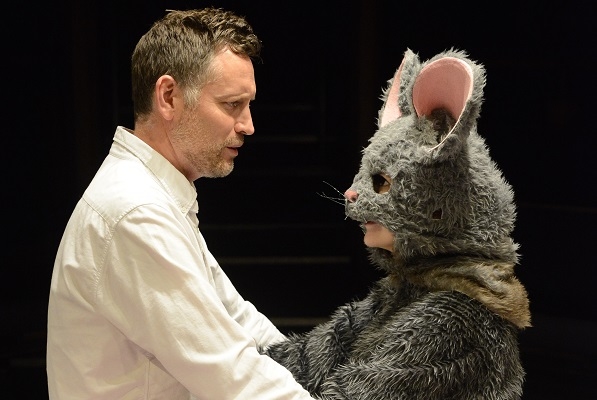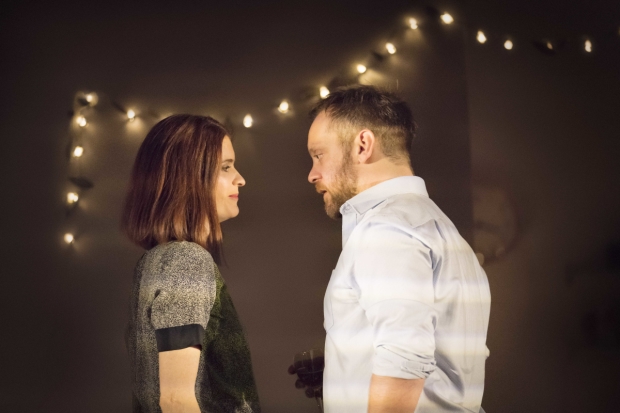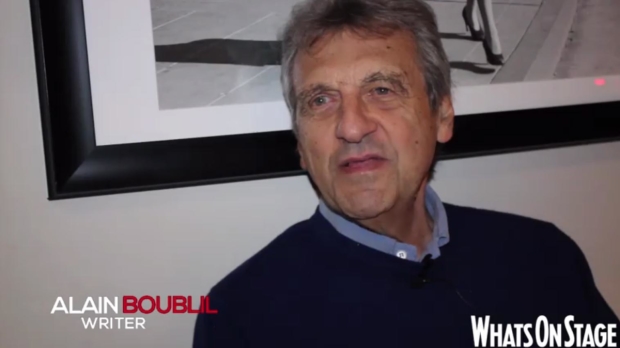Review: The End of Hope (Soho Theatre)

© Robert Day
Two bodies are bouncing on a circular bed, properly going for it. As they come to a climax, the satin covers slip off, revealing a middle-aged man and – um – a human-sized mouse. The lovers collapse, catch their post-coital breath. "I’ve never slept with a giant mouse before." Well, right. Who has?
For all that David Ireland‘s two-hander is a raunchy little romcom, it’s also a piece packing explosives in its pants. The personal, here, is absolutely political, so that a Brief Encounter for the Tinder generation doubles up as an affront on male entitlement and arbitrary cultural divides.
At its simplest, The End of Hope spoofs the shape of modern love. Hook-up culture, it says, gets it all back to front. A play that starts with a furious shag ends with an introduction and a first kiss. The mouse is a young woman from Belfast, rife with insecurities, who’s freed up by the anonymity of a costume. The bloke is the latest in a long line of hook-ups. Over the course of the play, their getting-to-know-you runs in reverse.
Ireland has plenty of fun with that, spinning lies and assumptions in every direction as these two lovers-cum-strangers try to pin each other down. She’s playful, spinning stories about her late husband’s demise. He’s presumptuous, insistently imposing labels on her. It becomes increasingly obvious that they’ve no common ground. She won’t watch Channel 4, for instance. He can’t stand ITV. She’s Protestant. He’s Catholic – albeit lapsed. He hates Tony Blair, she likes his hair. All the while, she insists on keeping the mouse costume on. God’s orders, she insists.
That, in itself, adds a theatrical charge, and Ireland writes with a pitch black sense of humour. Dark zingers fly back and forth like double act patter, making a loaded situation all the more fraught and adding real comic crackle to Max Elton’s production. Elinor Lawless is superb as the mousey woman, balancing extreme vulnerability with sharp retorts, while Rufus Wright smoothes over the man’s violence with charm.
This week of all weeks, days after Harvey Weinstein’s abuse came to light, The End of Hope has a double-strength punch. It puts male entitlement to the sword – the man’s needling refusal to take no for an answer; his insistence on calling the shots. Ireland almost subverts consent: an above-board bonk followed by unreasonable demands. "I’d like you to take the mouse head off," the man purrs – a request that, deep down, conceals a command. When she refuses, he pushes until she gives in. It feels like an aberration – even more so being personal, not merely physical.
Later, he wheedles his way towards sex. "You can’t just turn me on and then not have sex with me," he insists, as if there were laws against that. Kneeling, hands out, he almost seems to be begging, but he’s not – he’s cajoling her, cornering her, veiling his threats. It’s appalling precisely because it’s so underhand; not quite coercion, but pressure nonetheless. It’s repulsive, but the moment he oversteps the slightest mark – losing his rag at another refusal or lurching at her – it’s shocking enough to draw gasps. Ireland lets us see that even tiny transgressions are transgressions too far.
Yet, such is his skill, you still warm to the pair of them. Both have their vulnerabilities, and the man – Dermot, a notorious poet – turns out to be hiding behind masks of his own: celebrity, masculinity, liberal morality. In amidst all the labels, and the things that divide them, the two still stand as a symbol of hope. "Everywhere in the world where there’s a war about religion, two people from each side should have sex," argues his partner. "We should literally make love and not war." In hook-ups, it seems, there’s hope for us all.
The End of Hope runs at Soho Theatre until 11 November.













